- Home
- Nora Roberts
Three Fates Page 9
Three Fates Read online
Page 9
“I can keep up with you, Slick.”
“Then move.” He pulled her out, kept a hand like a vise on her arm as he jogged down to where the alley opened onto the street. When they came out on the street, he shot a quick glance in either direction, swore and turned a hard right. He slid an arm around her waist.
“Just keep walking. Two men across the street. One heading toward the club, the other for the alley. Don’t look back!”
But she already had, and made out both of them quickly enough. “We could take them.”
“Christ. Just walk. If we’re lucky, they didn’t see us come out that way.”
At the corner he glanced back. “So much for luck.” He switched his grip to her hand. “Here’s your chance to prove you can keep up.”
He ran, and when they were halfway down the block, yanked her out in the street and across traffic. Brakes squealed, horns blasted. Cleo felt the wind from a fender that missed her by inches.
“You crazy son-of-a-bitch.” But when she looked back she saw a man trying to thread his way between cars. She didn’t slow down. The heels of her boots skidded and slipped over the uneven bricks. If she could have spared ten seconds, she’d have dragged them off and run barefoot.
“There’s only one,” she called out. “There are two of us.”
“The other’s somewhere.” Following instinct, he pulled her into a restaurant, raced with her past a number of startled diners and through the kitchen and out the back onto the narrow street.
“Oh baby.” It was nearly a prayer when he spotted the sleek black motorcycle parked against the back of the building. “Give me a hairpin.”
“You start that thing with a hairpin, I’ll kiss your ass.” But panting a bit, she dragged one out of her hair.
Her hair tumbled free as he used the pin to pry off the ignition box. Within ten seconds, he had it hot-wired and was swinging his leg over.
“Get on. You can kiss my ass at a more private moment.”
Her skirt hiked up to crotch level as she climbed on so her black G-string pressed snug against his butt. He ignored that, as best he could, and the way her breasts pressed into his back as he whipped the bike into a tight circle and flew toward the mouth of the alley with the roar of a serious engine.
She strapped her arms around him and let out a whoop when they shot down the street. At the corner, he nearly ran over the toes of the man who’d pursued them. Cleo got a good, close look at his shocked and furious face, and laughed wildly as Gideon leaned into the turn.
“They’ve got a car!” she called out, straining to see behind her as the wind whipped her hair into her face. “The other guy must’ve gotten the car, the one you nearly creamed’s getting in it.”
“That’s all right.” Gideon swung around another corner, punched it, then bulleted down the first side street. “We’ll lose them on this.”
Using the map in his head, he maneuvered out of the city. He wanted an open road, the dark, and the quiet. He wanted five damn minutes to think.
“Hey, Slick.” Her voice was close to his ear. He could smell her, a pungent and erotic combination of female and leather. He could be sure now that her breasts, and they were beauties, were the ones God had given her.
“What? I’ve got to concentrate here.”
“You just go right ahead. I wanted you to know I’m not interested in the five thousand anymore.”
“You don’t sell that statue to me, they’ll keep after you.”
“We’ll talk about the why of that when we’re not so busy.” She looked behind her, at the lights and glow of Prague. “But the five thousand’s off the table.” She leaned into him again. “Because I just became your fucking partner.”
To seal the deal she nipped lightly at his ear. And laughed.
Five
“YOU lost track of them.” Anita Gaye leaned back against the butter-soft leather of her desk chair and examined her manicure. The phone call did not please her.
“Were my instructions unclear?” she asked in a low, silky voice. “Which part of ‘locate the woman and find out what she knows’ didn’t you understand?”
Excuses, she thought as she listened to her employee’s apologetic explanation. Incompetence. It was really very annoying.
“Mr. Jasper?” she interrupted in the most pleasant of tones. “I believe I told you ‘by any means.’ Do you need a definition of that phrase? No? Well then, I suggest you find them, and quickly, or I’ll be forced to think you’re not half as clever as a second-rate Irish tour guide.”
She broke the connection, then to calm herself swiveled in the chair to gaze out at her view of New York. She enjoyed being able to watch the noise and bustle of the city, while being removed from it.
She enjoyed more knowing she could leave her plush corner of the elegant brownstone, stroll directly onto Madison Avenue, wander into any of the tony shops and have whatever her whim dictated.
And be recognized, admired, envied, as she did so.
There had been a time, not so many years before, when she’d been out there on the streets, rushing over the pavement, hounded with worries about rent payments, credit card bills and how to stretch her paycheck into one more good pair of shoes.
Standing with her nose pressed to the window, she thought now, knowing she was better, smarter, worthier than any of the ladies-who-shopped inside that cool, fragrant air, trailing pampered fingers over hand-stitched silks.
She’d never had a doubt she’d be on the other side, the right side of the glass. She’d never had a doubt she was meant to be.
She’d had something a great many of the workforce lacked as they’d scrambled to their next hive. A towering ambition and a nearly violent belief in self. She’d never intended to work her life away just to put a roof over her head.
Unless the roof was spectacular.
She’d always had a plan. A woman, Anita thought as she pushed back from the rosewood desk, was a man’s toy, his doormat or his punching bag if she didn’t have a plan. And most often, a combination of the three.
With a plan, and the brains to implement it, he became hers.
She’d worked hard to get where she was. If marrying a man old enough to be her grandfather wasn’t work, she didn’t know the meaning of the word. When a twenty-five-year-old woman had sex with a sixty-six-year-old man, the woman—by God—worked.
She’d given Paul Morningside his money’s worth. For twelve long, laborious years. Dutiful wife, faithful assistant, elegant hostess and live-in whore. He’d died a happy man. And not a minute, in Anita’s estimation, too soon.
Morningside Antiquities was hers now.
Because it always entertained her, she took a turn around her office, letting her heels sink into the faded wool of the Bokara carpet, click lightly on polished wood. She’d selected every piece personally, from the George III settee to the T’ang horse riding on a shelf of the Regency breakfront.
It was a mix of styles and eras that appealed to her, an elegant and distinctly female melding, all in superior taste. She’d learned a great deal from Paul, about value, continuity and perfection.
The colors were soft. She saved the bold and splashy for other areas, but her downtown office was done in quiet female tones. The better to seduce clients and competitors.
Best of all, she thought as she picked up an opal snuff box, everything in the room had once belonged to someone else.
There was such a thrill in possessing what had been another’s. It was, to her mind, a kind of theft. A legal one. Even a distinguished one. What could be more exciting?
She was perfectly aware that after fifteen years, three of them as head of Morningside, some continued to consider her little more than a gold digger.
They were wrong.
There had been gossip, there had been snide comments when Paul Morningside had fallen for a woman more than forty years his junior.
Some had passed her off as a bimbo.
They’d been very wrong.
They were wrong, too.
She had pale, flawless skin, a small, streamlined nose. And a body a former lover had described as a walking wet dream.
She presented the package carefully. Tailored suits for business, fashionably elegant gowns for social occasions. Throughout her marriage she’d been meticulous about her behavior, public and private. There might have been some who whispered, but there were no whiffs of scandal, no questionable behavior attached to Anita Gaye.
Some might continue to look askance, but they accepted her invitations, and they issued them to her in return. They patronized her company, and paid well for the privilege.
Inside the package was the brain of a born operator. Anita Gaye was the dedicated widow, the society hostess, the respected businesswoman. She intended to live the part for the rest of her days.
It was, she mused, the longest con on record.
Gold digger, she thought with a quiet laugh. Oh no, it had never been just about money. It had been about position and power and prestige.
It was no more about dollars and cents than owning something was about filling space on a shelf. It was about status.
She crossed to a Corot landscape, pushed a mechanism hidden in the frame to lever out the painting. With quick fingers she punched in her security code on the keypad behind it, input the combination to the safe.
For her own pleasure, she took out the silver Fate.
And hadn’t it been fate, she reflected, that had had her traveling to Dublin, spending those few weeks overseeing the opening of a Morningside branch there? Just as it had been fate that had urged her to take an appointment with one Malachi Sullivan.
She’d known of the Three Fates. Paul had told her the story. He’d had an endless supply of long-winded, tedious stories. But this one had caught her interest. Three silver statues, forged, some said, on Olympus itself. That, of course, was nonsense, but legend added a luster, and a value, to objects. Three sisters, separated by time and circumstances, falling into various hands over the years. And separated, they were no more than pretty bits of art.
But if and when they were brought together . . . She ran her fingertip over the shallow notch in the base, where Clotho had once linked to Lachesis. Together, they were beyond price. And some, a gullible some in Anita’s mind, said that together they were beyond power. Wealth beyond imagining, control of one’s own destiny unto immortality.
Paul hadn’t believed they existed. A pretty story, he’d claimed. A kind of Holy Grail for collectors of antiquities. She’d passed it off as well. Until Malachi Sullivan had asked for her professional opinion.
It had been child’s play to seduce him into seducing her. Then to blind his caution with lust until he trusted her enough to put the statue into her hands. For tests and assessments, she’d told him. For research.
He’d told her enough, more than enough to assure her that she could take the statue from him with impunity. What could he do—some middle-class Irish sailor, descended by his own accounting from a thief—against a woman of her unimpeachable reputation?
Stealing outright, she thought now, had been a glorious rush.
He’d made noise, of course, but her money and position, and the miles of ocean between them, insulated her against any trouble he could stir. As she’d expected, he’d quieted down again in a matter of weeks.
What she hadn’t expected was for him to outmaneuver her—even temporarily—for the other two pieces of the prize. She’d wasted time delicately questioning Wyley Antiques’s current owners while he had zeroed in on Tia Marsh.
He got nothing from her, Anita knew now. There hadn’t been time. There’d been nothing in her hotel room, nothing on her laptop that pertained to the statues, or to her ancestor.
And nothing in the more discreet search of her New York apartment. Still, she believed Tia was a key, one worth turning in any case.
She’d pursue that personally, she decided. Just as she would pursue the New York thread of Simon White-Smythe personally. She’d leave her incompetent employees to track down the black sheep of that family, while she courted the cream of it.
Once she had the second Fate, she’d use all her resources, all her energies, by any means, to find and acquire the third.
TI A SPENT THE first twenty-four hours after the flight home sleeping or shuffling around her apartment in her pajamas. Twice she woke up in the dark without a clue where she was. And, remembering, had hugged herself in sheer joy before snuggling back into her pillow and sleep.
The second day, she indulged in a long bath—lukewarm water and plenty of lavender oil—then changed into fresh pajamas and went back to sleep.
When she was awake and wandering the apartment, she’d stop to touch something—the back of a chair, the side of a table, the round dome of a paperweight. She would think, Mine. My things, my apartment, my country.
She could open the drapes and look out on her view of the East River, enjoy the look of the water that always managed to soothe and thrill her. Or close them again and imagine herself in a lovely, cool cave.
There was no one waiting for her, no need to dress, to style her hair, to gear up mentally and emotionally for an appearance.
She could, if she wanted, stay in her pajamas for a week and talk to no one. She could lie in her own, wonderful bed and do nothing but read or watch television.
Of course, that was bad for the back. And, of course, she needed to fix proper meals and reacquaint her system with basic routine. She was running low on echinacea, too, and really needed to go out and buy some fresh bananas if she didn’t want her potassium level to dip.
But she could make it one more day. Just one more. Because the prospect of having no conversations whatsoever, even with a clerk at the market, was so wonderful it was worth the risk of a potassium dip.
To relieve her guilt for not phoning her family, not stirring herself to travel the few blocks to see her mother, she sent her parents an e-mail. Then she confirmed her next appointment with Dr. Lowenstein the same way.
She loved e-mail, and offered thanks that she lived in an age in which it was possible to communicate without speaking.
Despite all her travel precautions, she was pretty sure she was coming down with a cold. Her throat was a bit scratchy, her sinuses a little stuffy. But when she took her temperature—twice—it was dead normal.
Still, she took some extra zinc, more echinacea and made herself a pot of chamomile tea. She was just settling down with it and a book on homeopathic remedies when her doorbell chimed.
She nearly ignored it. It was guilt that had her setting cup and book aside. It could very well be her mother, who tended to drop by unannounced. And who would, certainly, let herself in with her key if Tia didn’t answer.
It was guilt as well that had her glancing around and wincing. Her mother would see that she’d been lounging around like a slug for days. She wouldn’t criticize—or she would mask her criticism so expertly in indulgence that Tia would, she knew, end up feeling like a self-centered, lazy child.
Worse, if she sniffed out even a hint of the cold Tia was sure she was brewing, she would make a terrible fuss.
Resigned, Tia peered out the peephole. And squeaked.
It wasn’t her mother.
Flustered, she pushed a hand through her hair and opened the door to a man she’d nearly convinced herself she’d imagined.
“Hello, Tia.” If Malachi thought it odd she was answering the door in her pajamas at three in the afternoon, his warm smile didn’t show it.
“Um . . .” Something about him seemed to cross-wire the circuits in her brain. She wondered if it was chemical. “How did you . . .”
&
nbsp; “Find you?” he finished. She looked a bit pale, he thought, and sleepy. The woman needed some fresh air and sunshine. “You’re in the book. I should’ve called, but I was in the neighborhood. More or less.”
“Oh. Well. Ah.” Her tongue wouldn’t cooperate on more than one syllable. She made a helpless gesture of invitation and had closed

 A Little Magic
A Little Magic Vision in White
Vision in White True Betrayals
True Betrayals The Next Always
The Next Always A Man for Amanda
A Man for Amanda Born in Fire
Born in Fire Tribute
Tribute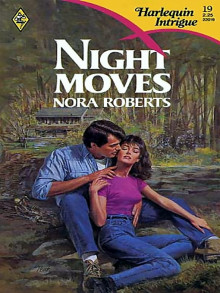 Night Moves
Night Moves Dance Upon the Air
Dance Upon the Air The Name of the Game
The Name of the Game Jewels of the Sun
Jewels of the Sun River's End
River's End Public Secrets
Public Secrets Homeport
Homeport Private Scandals
Private Scandals The Witness
The Witness Blithe Images
Blithe Images Hidden Riches
Hidden Riches Key of Light
Key of Light Divine Evil
Divine Evil High Noon
High Noon Blue Dahlia
Blue Dahlia Sea Swept
Sea Swept This Magic Moment
This Magic Moment Year One
Year One A Little Fate
A Little Fate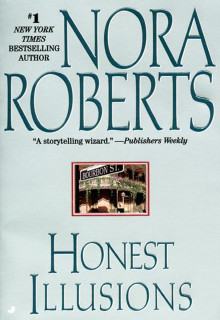 Honest Illusions
Honest Illusions The Reef
The Reef Shelter in Place
Shelter in Place The Hollow
The Hollow Holding the Dream
Holding the Dream The Pagan Stone
The Pagan Stone Savour the Moment
Savour the Moment The Perfect Hope
The Perfect Hope Island of Glass
Island of Glass Happy Ever After
Happy Ever After Bed of Roses
Bed of Roses Stars of Fortune
Stars of Fortune Dark Witch
Dark Witch The Return of Rafe MacKade
The Return of Rafe MacKade Chesapeake Blue
Chesapeake Blue The Perfect Neighbor
The Perfect Neighbor The Collector
The Collector Come Sundown
Come Sundown Rebellion
Rebellion Affaire Royale
Affaire Royale Daring to Dream
Daring to Dream Bay of Sighs
Bay of Sighs Blood Magick
Blood Magick Angels Fall
Angels Fall Captivated
Captivated The Last Boyfriend
The Last Boyfriend Irish Thoroughbred
Irish Thoroughbred Inner Harbor
Inner Harbor The Right Path
The Right Path Night Shadow
Night Shadow The Heart of Devin MacKade
The Heart of Devin MacKade Shadow Spell
Shadow Spell The Playboy Prince
The Playboy Prince The Fall of Shane MacKade
The Fall of Shane MacKade Rising Tides
Rising Tides Command Performance
Command Performance Hidden Star
Hidden Star Cordina's Crown Jewel
Cordina's Crown Jewel The MacGregor Brides
The MacGregor Brides The Pride of Jared MacKade
The Pride of Jared MacKade Born in Ice
Born in Ice Whiskey Beach
Whiskey Beach The Last Honest Woman
The Last Honest Woman Night Shield
Night Shield Born in Shame
Born in Shame Secret Star
Secret Star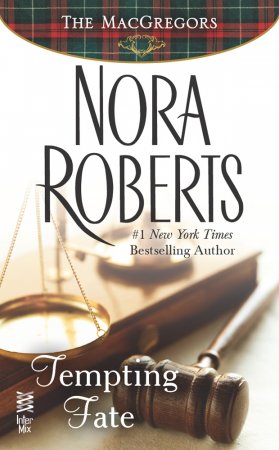 Tempting Fate
Tempting Fate Nightshade
Nightshade The Obsession
The Obsession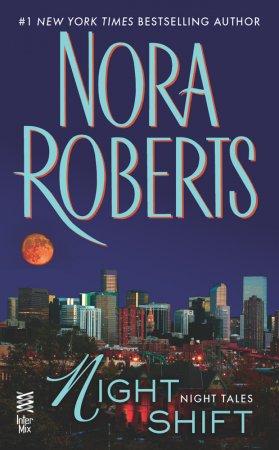 Night Shift
Night Shift Playing The Odds
Playing The Odds Tears of the Moon
Tears of the Moon One Man's Art
One Man's Art The MacGregor Groom
The MacGregor Groom Irish Rebel
Irish Rebel Morrigan's Cross
Morrigan's Cross In From The Cold
In From The Cold Night Smoke
Night Smoke Finding the Dream
Finding the Dream Red Lily
Red Lily The Liar
The Liar Montana Sky
Montana Sky Heart of the Sea
Heart of the Sea All The Possibilities
All The Possibilities Opposites Attract
Opposites Attract Captive Star
Captive Star The Winning Hand
The Winning Hand Key of Valor
Key of Valor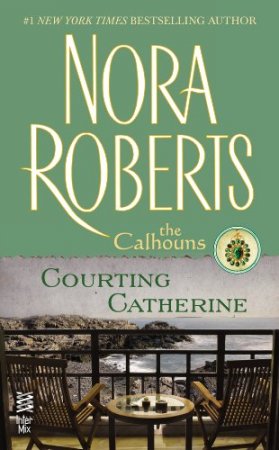 Courting Catherine
Courting Catherine Heaven and Earth
Heaven and Earth Face the Fire
Face the Fire Untamed
Untamed Skin Deep
Skin Deep Enchanted
Enchanted Song of the West
Song of the West Suzanna's Surrender
Suzanna's Surrender Entranced
Entranced Dance of the Gods
Dance of the Gods Key of Knowledge
Key of Knowledge Charmed
Charmed For Now, Forever
For Now, Forever Blood Brothers
Blood Brothers Sweet Revenge
Sweet Revenge Three Fates
Three Fates Mind Over Matter
Mind Over Matter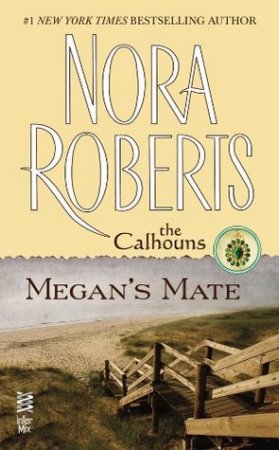 Megan's Mate
Megan's Mate Valley of Silence
Valley of Silence Without A Trace
Without A Trace The Law is a Lady
The Law is a Lady Temptation
Temptation Dance to the Piper
Dance to the Piper Blue Smoke
Blue Smoke Black Hills
Black Hills The Heart's Victory
The Heart's Victory Sullivan's Woman
Sullivan's Woman Genuine Lies
Genuine Lies For the Love of Lilah
For the Love of Lilah Gabriel's Angel
Gabriel's Angel Irish Rose
Irish Rose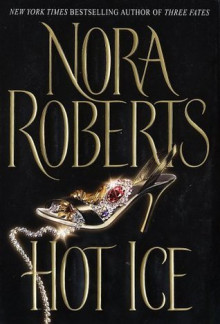 Hot Ice
Hot Ice Dual Image
Dual Image Lawless
Lawless Catch My Heart
Catch My Heart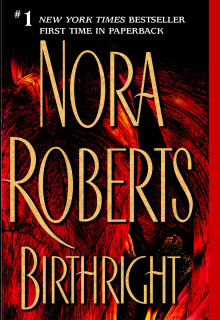 Birthright
Birthright First Impressions
First Impressions Chasing Fire
Chasing Fire Carnal Innocence
Carnal Innocence Best Laid Plans
Best Laid Plans The Villa
The Villa Northern Lights
Northern Lights Local Hero
Local Hero Island of Flowers
Island of Flowers The Welcoming
The Welcoming All I Want for Christmas
All I Want for Christmas Black Rose
Black Rose Hot Rocks
Hot Rocks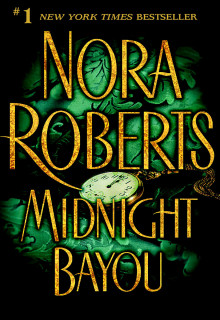 Midnight Bayou
Midnight Bayou The Art of Deception
The Art of Deception From This Day
From This Day Less of a Stranger
Less of a Stranger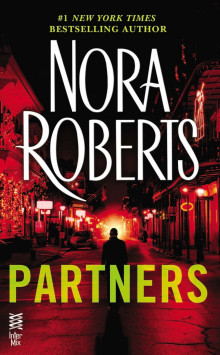 Partners
Partners Storm Warning
Storm Warning Once More With Feeling
Once More With Feeling Her Mother's Keeper
Her Mother's Keeper Sacred Sins
Sacred Sins Rules of the Game
Rules of the Game Sanctuary
Sanctuary Unfinished Business
Unfinished Business Cordina's Royal Family Collection
Cordina's Royal Family Collection Dangerous Embrace
Dangerous Embrace One Summer
One Summer The Best Mistake
The Best Mistake Boundary Lines
Boundary Lines Under Currents
Under Currents The Stanislaski Series Collection, Volume 1
The Stanislaski Series Collection, Volume 1 The Rise of Magicks
The Rise of Magicks The Rise of Magicks (Chronicles of The One)
The Rise of Magicks (Chronicles of The One) The Awakening: The Dragon Heart Legacy Book 1
The Awakening: The Dragon Heart Legacy Book 1 Dance of Dreams
Dance of Dreams Skin Deep: The O'Hurleys
Skin Deep: The O'Hurleys The Quinn Legacy: Inner Harbor ; Chesapeake Blue
The Quinn Legacy: Inner Harbor ; Chesapeake Blue![[Chronicles of the One 03.0] The Rise of Magicks Read online](http://i1.bookreadfree.com/11/chronicles_of_the_one_03_0_the_rise_of_magicks_preview.jpg) [Chronicles of the One 03.0] The Rise of Magicks
[Chronicles of the One 03.0] The Rise of Magicks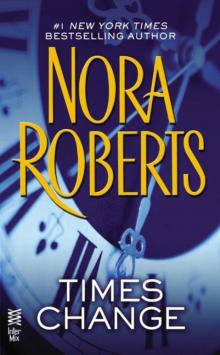 Times Change
Times Change Dance to the Piper: The O'Hurleys
Dance to the Piper: The O'Hurleys Christmas In the Snow: Taming Natasha / Considering Kate
Christmas In the Snow: Taming Natasha / Considering Kate Waiting for Nick
Waiting for Nick Summer Desserts
Summer Desserts Dream 2 - Holding the Dream
Dream 2 - Holding the Dream The Novels of Nora Roberts, Volume 2
The Novels of Nora Roberts, Volume 2 In the Garden Trilogy
In the Garden Trilogy Eight Classic Nora Roberts Romantic Suspense Novels
Eight Classic Nora Roberts Romantic Suspense Novels Best Laid Plans jh-2
Best Laid Plans jh-2 From the Heart
From the Heart Holiday Wishes
Holiday Wishes Dream 1 - Daring to Dream
Dream 1 - Daring to Dream Second Nature
Second Nature Summer Pleasures
Summer Pleasures Once Upon a Castle
Once Upon a Castle Stars of Mithra Box Set: Captive StarHidden StarSecret Star
Stars of Mithra Box Set: Captive StarHidden StarSecret Star Impulse
Impulse The Irish Trilogy by Nora Roberts
The Irish Trilogy by Nora Roberts The Pride Of Jared Mackade tmb-2
The Pride Of Jared Mackade tmb-2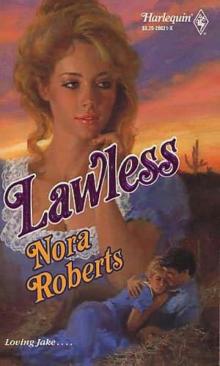 Lawless jh-3
Lawless jh-3 Taming Natasha
Taming Natasha Endless Summer
Endless Summer Bride Quartet Collection
Bride Quartet Collection Happy Ever After tbq-4
Happy Ever After tbq-4 Heart Of The Sea goa-3
Heart Of The Sea goa-3 Search for Love
Search for Love Once upon a Dream
Once upon a Dream Once Upon a Star
Once Upon a Star Dream Trilogy
Dream Trilogy Risky Business
Risky Business The Novels of Nora Roberts, Volume 3
The Novels of Nora Roberts, Volume 3 Dream 3 - Finding the Dream
Dream 3 - Finding the Dream Promises in Death id-34
Promises in Death id-34 The Novels of Nora Roberts, Volume 4
The Novels of Nora Roberts, Volume 4 The Perfect Hope ib-3
The Perfect Hope ib-3 Less than a Stranger
Less than a Stranger Savour the Moment: Now the Big Day Has Finally Arrived, It's Time To...
Savour the Moment: Now the Big Day Has Finally Arrived, It's Time To... Convincing Alex
Convincing Alex Bed of Roses tbq-2
Bed of Roses tbq-2 Savour the Moment tbq-3
Savour the Moment tbq-3 Lessons Learned
Lessons Learned Key Of Valor k-3
Key Of Valor k-3 Red lily gt-3
Red lily gt-3 Savor the Moment
Savor the Moment The Return Of Rafe Mackade tmb-1
The Return Of Rafe Mackade tmb-1 For The Love Of Lilah tcw-3
For The Love Of Lilah tcw-3 Black Rose gt-2
Black Rose gt-2 Novels: The Law is a Lady
Novels: The Law is a Lady Chesapeake Bay Saga 1-4
Chesapeake Bay Saga 1-4 Considering Kate
Considering Kate Moon Shadows
Moon Shadows Key of Knowledge k-2
Key of Knowledge k-2 The Sign of Seven Trilogy
The Sign of Seven Trilogy Once Upon a Kiss
Once Upon a Kiss The Novels of Nora Roberts, Volume 5
The Novels of Nora Roberts, Volume 5 Suzanna's Surrender tcw-4
Suzanna's Surrender tcw-4 The Quinn Brothers
The Quinn Brothers Falling for Rachel
Falling for Rachel Brazen Virtue
Brazen Virtue Time Was
Time Was The Gallaghers of Ardmore Trilogy
The Gallaghers of Ardmore Trilogy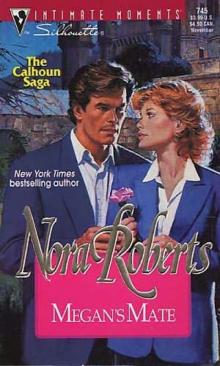 Megan's Mate tcw-5
Megan's Mate tcw-5 Loving Jack jh-1
Loving Jack jh-1 Rebellion & In From The Cold
Rebellion & In From The Cold Blue Dahlia gt-1
Blue Dahlia gt-1 The MacGregor Grooms
The MacGregor Grooms The Next Always tibt-1
The Next Always tibt-1 The Heart Of Devin Mackade tmb-3
The Heart Of Devin Mackade tmb-3 The Novels of Nora Roberts Volume 1
The Novels of Nora Roberts Volume 1 Treasures Lost, Treasures Found
Treasures Lost, Treasures Found Nora Roberts's Circle Trilogy
Nora Roberts's Circle Trilogy The Key Trilogy
The Key Trilogy The Fall Of Shane Mackade tmb-4
The Fall Of Shane Mackade tmb-4 A Will And A Way
A Will And A Way Jewels of the Sun goa-1
Jewels of the Sun goa-1 Luring a Lady
Luring a Lady